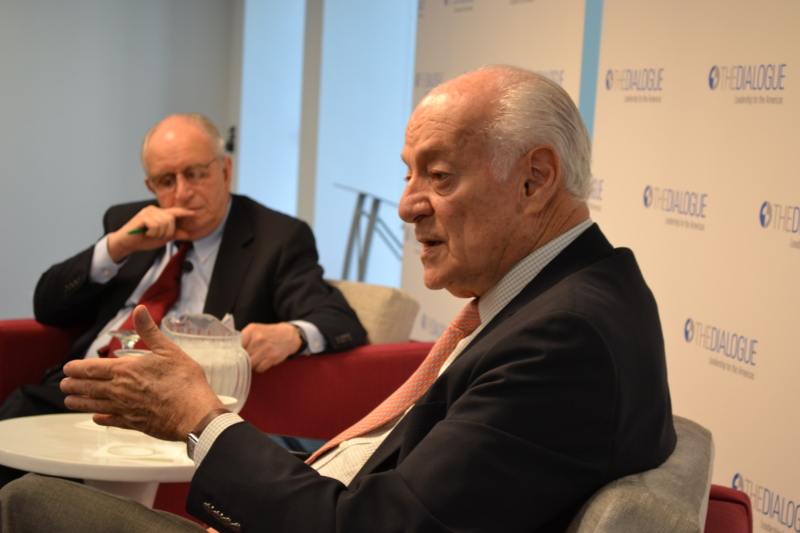US-Mexico Relations in Flux
 Ben Raderstorf / Inter-American Dialogue
Ben Raderstorf / Inter-American Dialogue
On July 20th, the Inter-American Dialogue invited Andrés Rozental, who served as deputy foreign minister and ambassador to the United Kingdom, to discuss the state of US-Mexico relations under the Trump administration. President Emeritus and Senior Fellow, Peter Hakim, moderated the discussion. The event focused on the re-negotiation of NAFTA and its future, migration and border policy, and Mexico’s political situation.
The future of NAFTA remains uncertain under the Trump administration. Andrés Rozental lamented the deteriorating relations between US and Mexico as a result of Trump’s continued attacks against NAFTA. According to Rozental, states in the United States, even those that voted for Trump, have benefited from NAFTA, but few politicians, with the exceptions of some governors, have failed to recognize NAFTA’s successes. The re-negotiations of NAFTA will be a long process among the US, Mexico, and Canada. Many keep their hopes on civil servants and lower-ranking bureaucrats in the US who still believe in and support NAFTA. However, Rozental believes the process will lag until 2019 and face severe challenges in the US and Mexico’s legislatures.
"The panorama, Peter, ain't great. It really ain't great." #USMXinFlux @Mexconsult pic.twitter.com/QkXcDB4p7a
— The Dialogue (@The_Dialogue) July 20, 2017
Rozental also lamented Trump’s escalating attacks on migrants and refugees, especially on Mexican nationals, and his continued emphasis on mass deportations. Rozental commented on the increasing operations of ICE officials beyond the border, the SB4 bill in Texas, the deportation of dreamers, and the threats of ending DACA that clearly show the shifting targets of deportations and the contradictions between Congress and the White House. Even though the media has focused on Trump’s aggressive yet inconsistent border wall plans, Rozental also called attention on the uncertainty of the Mérida Initiative and its effects on security in Mexico. For Rozental, Mexico is carrying most of the burden in enforcing drug policy while the US continues to erode longstanding relations between the two nations. Rozental reminded the audience that the US depends on a stable neighbor.
Mexico’s stability is also threatened by the upcoming presidential elections in the country. Rozental predicted the elections will most likely revolve around the domestic agenda, mainly corruption and increasing violence, but an international agenda on the future of US-Mexico relations might have an effect on voters. Rozental painted a bleak picture if Andrés Manuel López Obrador is elected. A populist right in the US and a populist left in Mexico would almost guarantee a breakdown of US-Mexico relations. Rozental found it curious that a surge of anti-Americanism has yet to occur, and he explained this might be a result of social structures in Mexico with strong ties to the immigrant community in the US.
The event concluded with a question and answer section on the influence of presidential candidate López Obrador, the role of US governors in NAFTA re-negotiations, judicial reforms in Mexico, the war on drugs, and Canada-Mexico relations.
Watch the full recording of the event here:



















